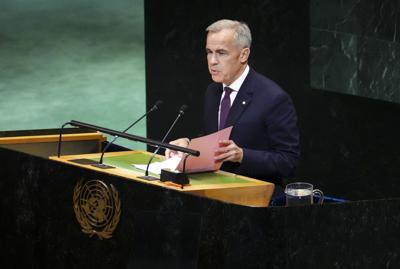Canada’s symbolic recognition of Palestine is hardly an earth shaking event, nor will it change the world.
But it is the right thing to do in the worst and most desperate of times.
No, it is not a reward for the Hamas massacre of Israelis on Oct. 7, 2023, as some critics contend. And it is not much of a prize at this point.
Rather, it is a direct response to Israel’s rightward turn — its counterattack without end against Palestinians in Gaza, and Prime Minister Benjamin Netanyahu’s stated aim to block the legitimate aspirations of Palestinians for self-determination in the West Bank.
Announcing his decision at the United Nations, in concert with other like-minded Western states, Prime Minister Mark Carney made clear that Canada condemns the “heinous attack” by Hamas and will not recognize the banned terrorist group as a governing authority in Gaza. But Carney also called out the death and destruction and food shortages in Gaza, alongside the relentless suffocation of the occupied West Bank by more Jewish settlements and military checkpoints.
For decades, Canadian foreign policy recognized the ultimate goal of Palestinian statehood, in peaceful coexistence with the State of Israel. However, Ottawa withheld formal recognition until the two countries had mapped out an agreement through hard bargaining between themselves — rather than relying on outsiders to do the heavy lifting and make the difficult compromises for them.
More than 150 other countries had lined up long before us to take this symbolic step. Admittedly it brought Palestine no closer to statehood, because facts on the ground matter more than diplomatic fictions.
For Canada, formal recognition was always intended to be the reward – the culmination of a peace process – instead of consolation prize. But that calculus is now outdated, and so Canada’s objective today is to keep the goal of a two-state solution alive while Netanyahu’s far-right government tries to destroy it.
True statehood, to be sure, demands that a governing entity be in control of established borders, which cannot yet be said of Palestine. In that sense, this is merely symbolic recognition — a fig leaf that will not magically give Palestinians true independence.
But it is not without purpose.
Instead of marking the start of sovereignty, it is a stopgap measure intended to prevent Israel from extinguishing Palestinian self-determination for all time. It also serves as a blunt reminder to Israelis that what they claim for themselves — the right to self-determination for Jews — cannot be forever denied to Palestinians who deserve no less.
To be sure, the peace process has long been on life support. It has been dying a slow death since the assassination of then-prime minister Yitzhak Rabin three decades ago by an Israeli nationalist fanatic — a gruesome event I covered shortly after arriving in the Middle East as a foreign correspondent, followed by yet more grim coverage of unfolding events in Gaza.
In the aftermath, Netanyahu won power, beginning his nearly three decades of undermining the Oslo peace process that had once brought Israelis and Palestinians together. Many are to blame for its failure, but the brutal terrorism of Hamas was always deliberate sabotage masquerading as legitimate resistance.
There were other missed opportunities — the reluctance of the Palestinian Authority under Yasser Arafat and later Mahmoud Abbas to close a deal with other Israeli prime ministers who offered better terms — setting the stage for stasis. Now, the window of opportunity is closing on compromise by either side, as anyone can see.
But even in this moment of darkness and destruction, only the wilfully blind would slam the window shut on two states for two peoples in the Holy Land. Israel would no longer be a democracy if voting rights were restricted to Jewish and Arab citizens living within its international borders yet forever denied to Palestinians living under perpetual occupation.
Those who fantasize of a one-state solution as a one-size-fits-all template are oblivious to the fratricide of the former Yugoslavia, where ethnic cleansing gave birth to sovereign states for separate peoples.
At this point it matters less whether you call it war crimes or massacres, ethnic cleansing or genocide. Words matter less than numbers, for the death toll in Gaza — by any measure — has long been indefensible, no matter how appalling the initial Hamas atrocity.
When Israel went to war against Iran in June, Netanyahu described Tehran’s government as an existential threat to Israel. Today, pursuing a war without end in Gaza, Israel has become an existential threat to itself.
It is at this dark time — when Palestinian self-determination seems so remote — that symbolic recognition of statehood is more important than ever. It is a diplomatic marker that cannot be erased by the diktats and declarations of the Netanyahu government in defiance of international law.
The peace process that gained momentum three decades is now moribund. But Canada and its international partners in diplomacy — Australia, Belgium, France, Portugal and the U.K. — still believe it possible and indeed essential to support Israelis and Palestinians both, without letting either side deny the other’s existence.
Error! Sorry, there was an error processing your request.
There was a problem with the recaptcha. Please try again.
You may unsubscribe at any time. By signing up, you agree to our and . This site is protected by reCAPTCHA and the Google and apply.
Want more of the latest from us? Sign up for more at our newsletter page.

























